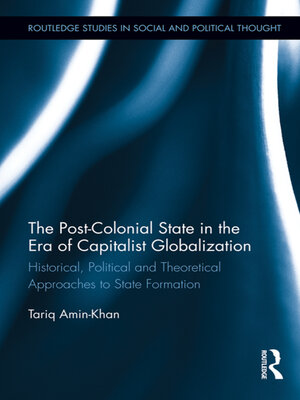The Post-Colonial State in the Era of Capitalist Globalization
ebook ∣ Historical, Political and Theoretical Approaches to State Formation · Routledge Studies in Social and Political Thought
By Tariq Amin-Khan

Sign up to save your library
With an OverDrive account, you can save your favorite libraries for at-a-glance information about availability. Find out more about OverDrive accounts.
Find this title in Libby, the library reading app by OverDrive.



Search for a digital library with this title
Title found at these libraries:
| Library Name | Distance |
|---|---|
| Loading... |
State formation in post-colonial societies differed greatly from the formation of the Western capitalist state. The latter has been extensively studied, while a coherent grasp of the post-colonial state has remained elusive. Amin-Khan provides a critical historical and contemporary understanding of post-colonial state formations in Asia and Africa, and suggests how this process differed from the formation of states in Latin America. In distinguishing between the post-colonial state and the Western capitalist state, the author argues that the unitary colonial state left a strong legacy on the decolonized states of Asia and Africa, reinscribing their subordination vis-à-vis Western states, transnational corporations and multilateral institutions. The indigenous elites' decision at the time of decolonization to retain colonial state structures meant the readaptation of capitalism-imperialism nexus to suit new post-colonial realities, which enabled the formation of clientelist relationships. This post-colonial reality and exploration of the contemporary context provides the basis of analyzing two post-colonial state forms, the capitalist and proto-capitalist varieties, which are examined using the case studies of India and Pakistan.







